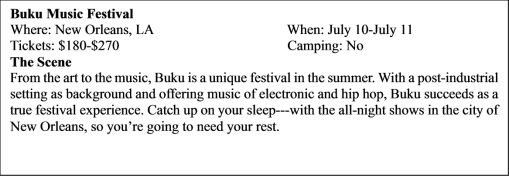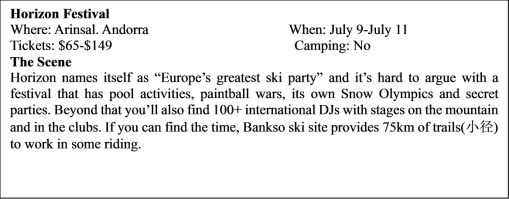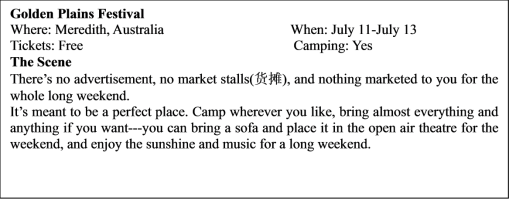1 . I was born and raised in England in a culture where privacy and “keeping yourself to yourself” were valued traditions. Speaking to strangers was not encouraged. People were most hospitable (好客的) and friendly — but only once they had been introduced to new people.
However, I have been lucky enough to spend some time in both Italy and the US, where I found traditions of hospitality and politeness to be very different.
I experienced Italian hospitality first-hand on a crowded railway carriage traveling, one afternoon, from Genoa to Florence. Sinking gratefully into an empty seat, I was berated (斥责) in rapid Italian by a gentleman who was returning to this seat — it had not been “spare” after all. I apologized in English, and got up to allow him back into the seat. The gentleman obviously had no understanding of the English language, but he, too, realized my genuine mistake. He smiled and gestured for me to remain in the seat, and he himself remained standing in the corridor for the rest of the journey. The other passengers of the carriage smiled and nodded at me and made me feel quite welcome amongst them. I feel that if this had been in England, a foreigner who made a mistake would not always be so kindly treated.
Transport was also obvious in the differences I noticed between English and American culture. I flew to New York on a plane with mainly English passengers. We sat together in near silence. Nobody spoke to me nor, as I expected, to anyone else they did not know. They felt it was not polite to disturb someone else’s privacy. However, when I traveled across the United States, whether by plane or Greyhound bus, I was never short of conversation. Conversation was going on all around me and whoever sat next to me was happy to introduce themselves and ask me about myself, which was usually a pleasant way to kill time. They obviously felt it would have been rude not to speak to another person, whether they were strangers or not.
1. What do we know about the passengers of the carriage when the author was travelling in Italy?| A.They were all on the side of the gentleman. |
| B.They all laughed at the author for this mistake. |
| C.They all showed their understanding of the author’s mistake. |
| D.They would not bear a mistake like the author’s in public. |
| A.they were too tired to speak | B.they are short of topics to talk about |
| C.they were all strangers to each other | D.privacy was a valued tradition in England |
| A.his traveling experiences |
| B.how to adapt ourselves to a new culture |
| C.the culture shock he experienced in Italy and the US |
| D.cultural differences in hospitality and politeness |
| A.Approving. | B.Confused. | C.Negative. | D.Disapproving. |
2 . Every year on June 21st, World Music Day is commemorated in over 120 countries, including its birthplace of France, to honor both amateur and professional musicians. Citizens of a city or country are permitted and encouraged to perform music outside in their neighborhoods, public areas, and parks on Music Day. Free concerts are also held, where musicians perform for the joy of it rather than for a fee.
In the 1970s, American musician Joel Cohen, who was then working for a French radio station, came up with the idea of having musicians perform on the evening of June 21 to celebrate the start of summer. It was finally accepted by France’s Ministry of Culture in 1982. The day started in France and has since extended to countries such as Belgium, the United Kingdom and others. It’s the ideal time to learn a new instrument or listen to songs they wouldn’t ordinarily include on their playlist. Every type of musician can celebrate World Music Day with friends, family, and even strangers, whether they are young, elderly, new, or seasoned professionals. The purpose is to promote music.
It makes no difference how good you are at making music; everyone can do it. This day can be used by even the most tone-deaf folks to sing their hearts out and appreciate the beauty and power of music. Music is not only a great way to express yourself, but it may also be beneficial to your health. A song might bring back a joyful memory or make you feel energized when you listen to it.
1. Where did the World Music Day begin?| A.France. | B.American. | C.Belgium. | D.China. |
| A.For reputation. | B.For entertainment. | C.For experience. | D.For occupation. |
| A.Those who are not expert in music are not welcome. |
| B.Joel Cohen put forward the idea of performing music for free. |
| C.The purpose of it is to instruct tone-deaf people in music. |
| D.You can listen to some songs not included on the playlist. |
| A.Challenging. | B.Critical. | C.Positive. | D.Sceptical. |
3 . Each year, the women of Olney and Liberal compete in an unusual footrace. Dressed in aprons(围裙)and headscarves,they wait at both towns-starting lines.Each woman holds a frying pan with one pancake inside. At the signal,the women flip(抛)their pancakes and they're off!
This “pancake racing”tradition is said to have started on Shrove Tuesday, 1445, in Olney. Shrove Tuesday is the day before the Christian season ofLent(大斋戒)begins.During Lent,many people decide to give up sugary or fatty foods.
Legend says that in 1445, an OIney woman was making pancakes to use up some of her sugar and cooking fats before Lent. She lost track of time and suddenly heard the church bells ring. signaling the beginning of the Shrove Tuesday serviceRealizing that she was going to be late for church, she raced out, still wearing her apron and headscarf and holding her frying pan with a pancake in it.
In the following years, the woman’s neighbors imitated(模仿)her dash to church and pancake racing was bon.Olney women continue this Shrove Tuesday tradition more than 500 years later.
In 1950, inspired by a picture of the OIney Pancake Race in a magazine, a resident of Liberal wanted his town to join in the fun.He called Olney to set up a friendly competition,and the people of Olney accepted.
The rules are simple. Racers must wear the traditional headscarfand apron. They must flip their pancakes twice once before starting and once after crossing the finish line.After the race, there are Shrove Tuesday church services.Then Liberal and Olney connect through a video call to compare race times and declare a winner.
In both towns, the races have grown into larger festivals. OIney's festival is an all-day event starting with a big pancake breakfast.Liberal's festival lasts four days, including a parade(游行),a talent show, and contests that feature eating and flipping pancakes.
1. What can we know about Olney Pancake Race?| A.It begins during Lent. |
| B.It was founded by a Olney woman. |
| C.It has been held annually since 1445. |
| D.Its origin can date back to 15th century. |
| A.Wear their own clothes. | B.Hold the pancake all the way. |
| C.Throw and catch the pancake twice. | D.Have the pancake cooked while running. |
| A.Olney's festival is held for four days. |
| B.Liberal’s festival has varieties of activities |
| C.Olney’s festival has more various competitions. |
| D.Liberal’s festival starts with a delicious breakfast. |
| A.Positive. | B.Negative. | C.Objective. | D.Subjective. |
4 . The other day, my friend Jane was invited to a 40th birthday party. The time printed on the invitation was 7:30 p. m. Jane went off with her husband David, expecting a merry evening of wine, food, and songs.
By 9:45, everybody was having great fun, but no food had appeared. Jane and David were restless. Other guests began whispering that they, too, were hungry. But no one wanted to leave, just in case some food was about to appear. By 11:00, there was still no food, and everyone was completely off their heads. Jane and David left, hungry and angry.
Their experience suggests that the words on the printed invitations need to be made clearer. Everyone reads and understands the invitations differently. Most of us would agree that 6:30-8:30 p. m. means drinks only, that after 8:00 p. m. or 8:30 p. m. means possible dinner, and that 9:30 p. m. and any time thereafter means no food — eat beforehand and roll up late.
But this is not always the case. If asked to a students' party at 6:30 p. m., it is normal for guests not to appear before midnight, if at all, and no one cares. Being the first to arrive — looking eager — is social death. When my mother is asked to a party at 6:30, she likes to be there, if not on time, then no later than seven. My age group (late thirties) falls somewhere between the two, but because we still think we're young, we're probably closer to student-time than grown-up time.
The accepted custom at present is confusing, sometimes annoying, and it often means you may go home hungry, but it does lend every party that precious element (要素) of surprise.
1. The underlined words "off their heads" probably mean " ".| A.tired | B.crazy | C.curious | D.hot |
| A.party invitations can be confusing |
| B.party-goers usually get hungry at parties |
| C.people should ask for food at parties |
| D.birthday parties for middle-aged people are dull |
| A.very difficult |
| B.particularly thoughtful |
| C.friendly and polite |
| D.socially unacceptable |
| A.It's safe to arrive late just when food is served. |
| B.It's wise to eat something before going to a party. |
| C.It's important to follow social rules of party-going. |
| D.It's necessary to read invitations carefully. |
5 . Music Festivals




1. Why do people in the Buku Music Festival need to catch up on their sleep?
| A.Sleep during the night is difficult. | B.Buku has a post-industrial setting. |
| C.The performances will last overnight. | D.The tickets for the festival are very expensive. |
| A.Buku Music Festival. | B.Horizon Festival. |
| C.Gasparilla Music Festival. | D.Golden Plains Festival. |
| A.On a mountain. | B.In a downtown square. |
| C.In a music hall. | D.In an open-air theatre. |



